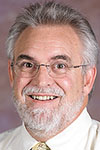Jeb Bladine: McMinnville's founder left an interesting will
We newspaper people tend to be packrats of history.
It shows in our weekly “Memory Lane” articles, “Vintage N-R” photographs and backroom stacks of newspapers dating into the 1800s. Our shelves, cabinets and old safe can produce long-unseen historic gems.
One of those pearls of the past that surfaced this week was a copy of the will for W.T. Newby: native of McMinnville, Tennessee (1820); pioneer member of the first “Great Migration” wagon train (1843); founder of McMinnville, OR (1856); and namesake of Newby Street, Newby Elementary School and various area historic markers.
For a succinct story about Newby and other local pioneers, see the history of McMinnville Water & Light compiled by Katherine Huit.
Speaking of succinct, William Thompson Newby’s 1875 will, effective after his 1884 death, was a model of brevity with fewer than 300 words, beginning:
“In the name of God, Amen; I, W.T. Newby of Yamhill County, State of Oregon, being of sound and disposing mind and not under any existing or undue influence of anyone, hereby make, publish and declare my last will and testament in manner and form following.”
He wanted his body to be “decently buried without any undue show or ostentation,” and desired that “all of my Just debt be paid.” Then it got more interesting.
Of his two sons he wrote, “ … being of age and sound in body and mind and able to provide for themselves, I therefore do not desire to give them anything.” He applied that same “do not desire” phrase to two daughters he characterized as “being married and well-provided for,” and three more daughters he was sure “will be well provided for after my death by friends and relatives.”
“I give all my real estate to my beloved wife, Sarah J. Newby,” he wrote, and “I desire that my personal property, after paying my debts and funeral expenses, be used in educating and supporting the minor children remaining after my death.”
Estate attorneys can debate the actual meaning of that last bequest, including the hand-written sentence on my copy that reads, “No minor children. All accounted for. The oldest son, James B., died at age 26, in 1870.”
Newby clearly lived a life “without any undue show or ostentation,” but his personal endeavors were well-documented in Katherine Huit’s history:
“Newby cut a ditch across his claim diverting water between two creeks – the aforementioned Baker Creek and the other known today as Cozine Creek. Next, he built a gristmill between the site of his cabin and Cozine Creek. Using the diverted water to turn the millstones, Newby’s mill enabled the area’s farmers to grind their grain locally, saving them time and the expense of transporting it to Oregon City for milling … He enticed new arrivals with legal titles to pieces of property in exchange for the establishment of businesses … With the arrival of more settlers, Newby set aside five acres of his land upon which to develop a town.”
McMinnville, it seems, has sturdy roots.
Jeb Bladine can be reached at jbladine@newsregister.com or 503-687-1223.









Comments